Understanding Zinc Deficiency and Sub-Optimal Zinc Levels
Zinc is considered an essential mineral for the body.
This means that you cannot live without zinc, it is ESSENTIAL or REQUIRED for life!
This means that if you do not have a sufficient amount of zinc in your body, you will feel it in the form of certain symptoms.
The good news is that you can use your symptoms to help you better understand zinc status in your body.
But before we talk about these symptoms we need to take a second to discuss the difference between serious and gross zinc deficiency and sub-optimal zinc levels.
When we take a global look at the zinc status of humans across the world, we find that roughly 30% of all humans are zinc deficient to some degree (1).
The problem is that most of this is gross zinc deficiency and comes from third-world countries and not from the developed countries where you are probably reading this from.
But just because people in developed countries don’t have a serious or life-threatening version of zinc deficiency does not mean that they are in the clear.
In fact, I find that a significant number of people in developed countries suffer from something called sub-optimal zinc levels.
Sub-optimal refers to the fact that they have a minor (but not huge) deficiency and one which is resulting in certain and specific symptoms.
So regardless of where you live, this information will be relevant to you!
Signs of Zinc Deficiency
Because zinc is so essential and because many different cells have a use for it, the symptoms of low zinc levels are quite diverse.
Zinc deficiency can impact your immune cells, your intestinal tract, your nerve cells, your thyroid, your skeletal system, your brain, and so much more.
As we discuss the symptoms of low zinc level make sure you are taking a mental tally of which symptoms you are suffering from.
If you find that you have 5+ or more of the symptoms listed below, then there is a good chance you may need to increase your uptake of zinc either through your diet or through supplementation (we will talk more about this later).
With that in mind, let’s talk about early warning signs of zinc deficiency and sub-optimal zinc levels…
#1. Impaired Immune Function
Impaired immune function simply means that your immune system isn’t working as well as it should.
Answer these questions:
Do you feel like you are getting sick more frequently than you used to?
Do you catch every single cold that you come into contact with?
Do you tend to get sick and stay sick longer than people around you who have the same illness?
Do you have a personal history of autoimmune disease?
If you answered yes to any of the above questions then there is a good chance that your immune system is impaired and zinc may be the culprit (2).
While it may not be possible to avoid every single illness that you come into contact with, your immune system should be strong enough to fight off or prevent SOME of them.
#2. Hair Loss
Are you experiencing changes in your hair either because it is falling out more or because your hair texture or quality has changed?
If so, zinc may be the cause!
Zinc is very important for the production and growth of hair from your hair follicles.
If you do not have enough zinc then your body will not be able to synthesize hair at the rate that it needs (3) to keep up with hair growth cycles.
If you can’t keep up then you will slowly notice that you are losing more hair than you are growing which will lead to hair fall and hair thinning.
#3. Skin Problems (acne or rashes)
This issue correlates with the hair loss issues as noted above.
Your skin is one massive organ and your hair is part of that organ.
So it follows that if you are experiencing hair issues related to zinc deficiency then you will probably also experience skin conditions because they are part of the same system.
Zinc deficiency can absolutely cause skin problems which usually manifest as acne or as rashes.
Acne associated with zinc tends to be cystic in nature which can help you differentiate it from other causes of acne.
The rashes tend to be associated with increased sensitivity in your skin to detergents, lotions, skin care products, and so on.
If you find that you previously didn’t have any issue with your skin but suddenly now you are more sensitive to these chemicals then it may be a sign you need more zinc.
#4. Fatigue
Do you feel like you are a little bit more run down than usual?
Do you feel like you don’t have the same amount of energy that you used to?
Do you feel like things that didn’t use to exhaust you are now leaving you feeling exhausted?
Do you feel like even after a great night’s sleep you aren’t ready to tackle the day with high energy?
This sort of fatigue can come along with zinc deficiency.
Unfortunately, fatigue is a very nonspecific symptom and all sorts of conditions ranging from thyroid problems to adrenal problems to other nutrient deficiencies can all cause fatigue.
So I wouldn’t try to diagnose zinc deficiency based on this symptom alone.
But if you have other symptoms such as hair loss, or an impaired immune system and you ALSO have fatigue then it becomes more likely that your fatigue may be caused by the zinc problem.
#5. Mild to moderate Thyroid Problems
Zinc is incredibly important for thyroid function in the body.
And low zinc levels have been shown to be a reversible cause of thyroid problems!
If you have a history of thyroid problems then you probably already realized that many of the symptoms of zinc deficiency closely match those seen in low thyroid conditions.
So if you have a history of Hashimoto’s thyroiditis, Graves’ disease, or low thyroid from any cause, make sure to pay close attention!
Taking zinc may be able to help improve your thyroid function.
#6. Decreased Appetite
This isn’t a very common symptom but you should be aware that zinc deficiency may cause a loss in your appetite.
This tends to be seen in more advanced cases of zinc deficiency, but it’s still worthwhile to be aware of.
#7. Low T3 Levels
Zinc plays an important role in something called thyroid conversion.
Thyroid conversion is the process where your body activates thyroid hormone by altering the T4 thyroid hormone into the T3 thyroid hormone.
Because zinc helps this process function, low levels of zinc may impair your ability to produce enough T3 thyroid hormone.
And this can be seen by checking your free T3 levels when you get your thyroid lab studies.
There are obviously plenty of other causes of low T3 but zinc deficiency is an important one!
#8. Food Allergies
Early zinc deficiency may increase your risk of developing food allergies or food sensitivities.
As zinc levels fall, your immune system may start to “flag” certain foods as unnatural which may trigger sensitivity and an immune response.
You can actually check for food allergies by looking at something called a delayed IgG food sensitivity test.
If you’ve ever had one of these then you may have found it strange that you are “allergic” or “sensitive” to all kinds of foods including rice, sweet potatoes, broccoli, and so on.
It’s unlikely that your body is actually allergic to these foods and much more likely that something like zinc deficiency is causing a problem in the processing of these foods by your immune system.
If you are otherwise healthy but suddenly find that you are not tolerating various types of healthy foods then be sure to look at your zinc levels.
#9. Intestinal Issues (such as Diarrhea)
The lower your zinc levels fall the looser your stools will become.
This can range from full-blown diarrhea to a change in your bowel movements slightly.
A deficiency in zinc can also increase your risk of developing gut inflammation and other intestinal issues such as leaky gut which may further impair gut function.
Should you Get Extra Zinc from Supplements or from Food (or both)?
What should you do if you feel that you have several of the symptoms listed above that you want to correct?
Should you take a zinc supplement, should you focus on adding foods rich in zinc to your diet, or should you run out and get a zinc blood test?
Let’s break these down one at a time:
Should you use a zinc supplement?
My recommendation is yes and the reason is simple.
Zinc is perfectly safe to take, causes very few issues if used as a low dose, and really only has the potential to help.
As long as you keep your dose of zinc low (in the 10mg per day range) you should not experience any negative side effects from using a zinc supplement.
And when you consider that MANY people are zinc deficient, the chances are high that it will help in some way.
Should you add zinc-rich foods to your diet?
It’s ALWAYS a good idea to add more nutrient-dense foods to your diet each and every day.
So, if possible, you should definitely add whole food sources of zinc in the form of food to your diet.
You should be aware, though, that altering your diet may not be enough to replace low zinc stores and it may not be the best strategy long-term.
If your diet led you to a zinc deficiency in the first place, then you MUST continue consuming foods high in zinc in order to keep your levels high.
If you change your diet or revert back to your old ways, it’s likely that your symptoms will return.
And lastly, should you get a zinc blood test from your doctor?
The answer is no.
The zinc lab test is very inaccurate and is NOT the best way to measure zinc levels (4) in your body or cells.
And because zinc supplements are often cheaper than getting a lab test, it just doesn’t make sense to get it done.
It’s cheaper, safer, and more effective to just add a zinc supplement and increase your consumption of zinc-rich foods.
The Bottom Line
I personally find that MANY people are zinc deficient and these patients tend to benefit from the use of added zinc to their diet/routine.
This is especially true of patients who already suffer from thyroid problems, those who are under significant daily stress, those who are not eating a whole food diet, and those who have intestinal issues such as leaky gut.
Again, if you find that you have more than 5+ of the symptoms listed above then it would be a great idea to consider adding extra zinc to your current regimen.
Now I want to hear from you:
Do you have any of the symptoms listed above? If so, how many?
Do you feel that your symptoms are related to your zinc status or to some other cause?
Do you ALSO have thyroid problems?
Have you noticed an improvement in your symptoms after taking zinc?
Leave your questions or comments below!
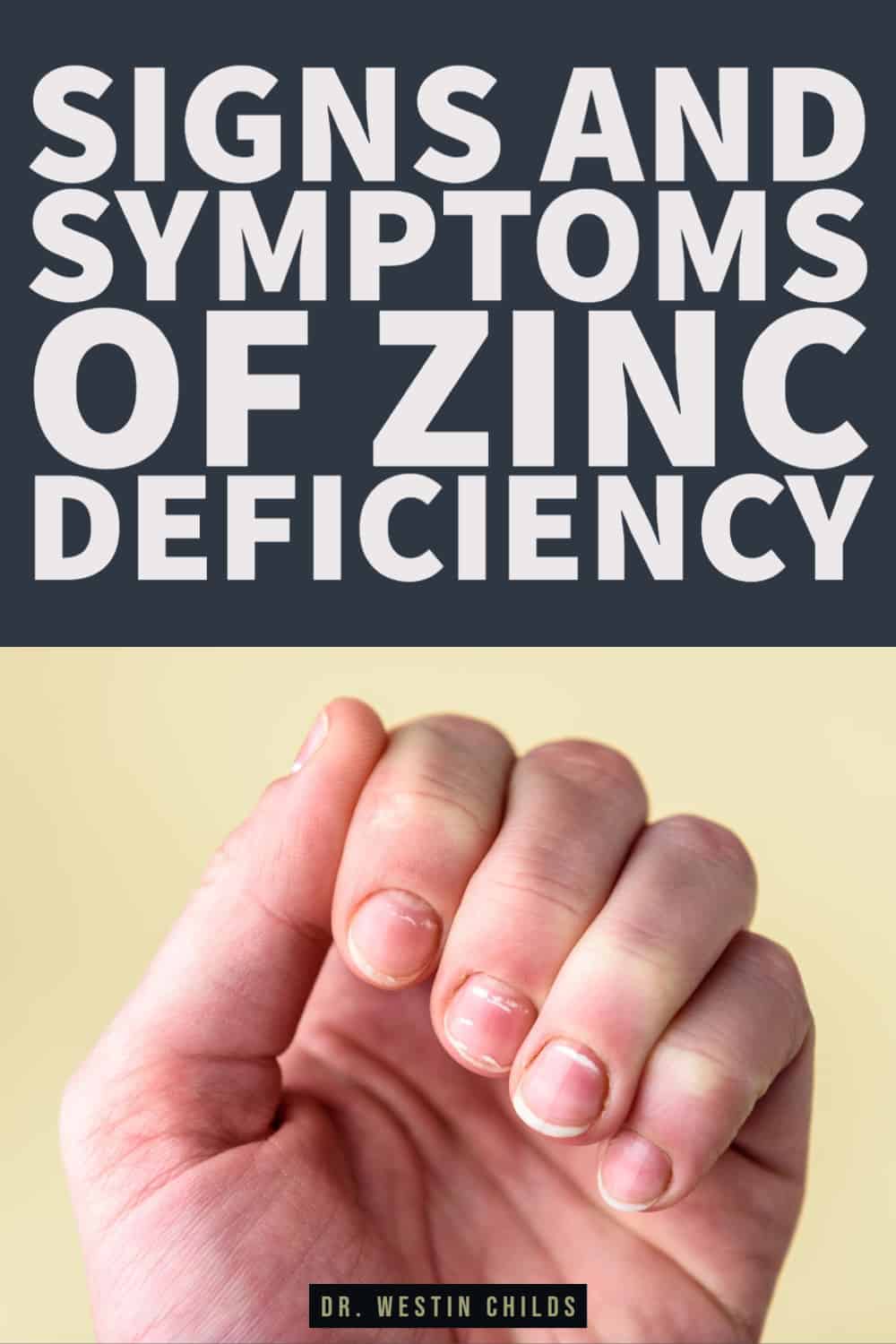
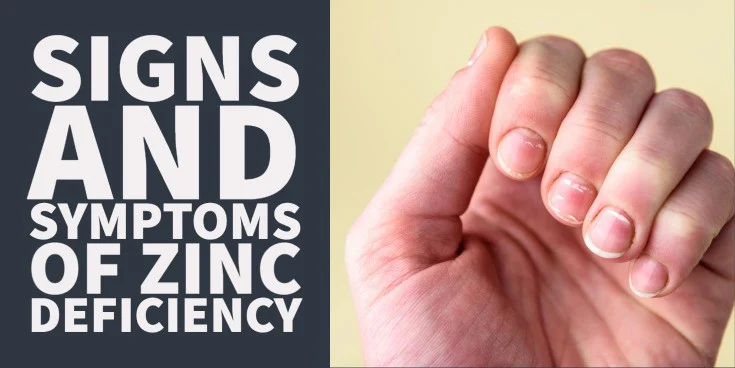

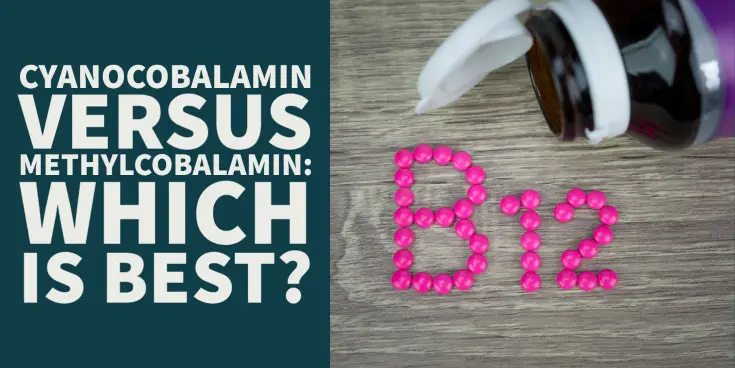
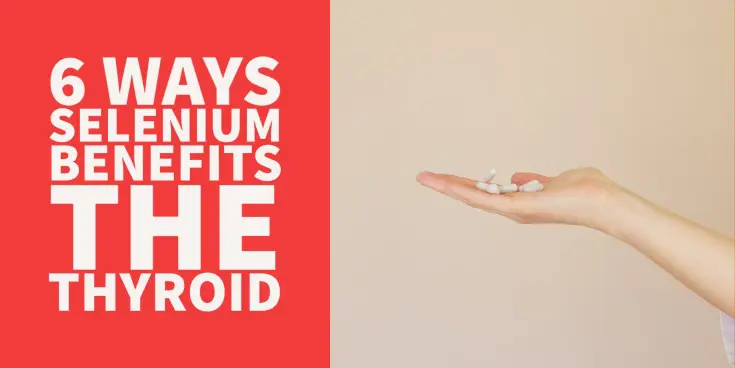
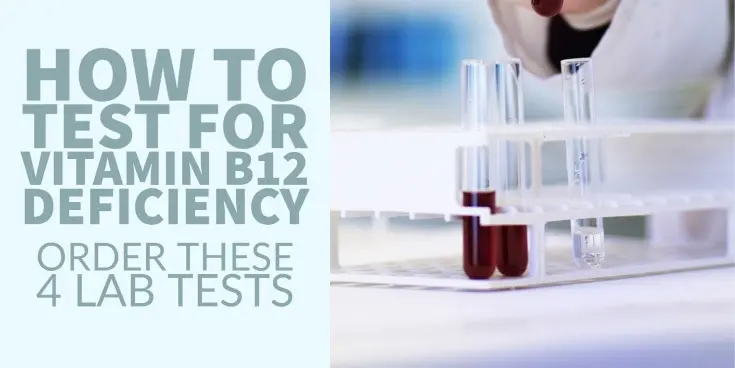
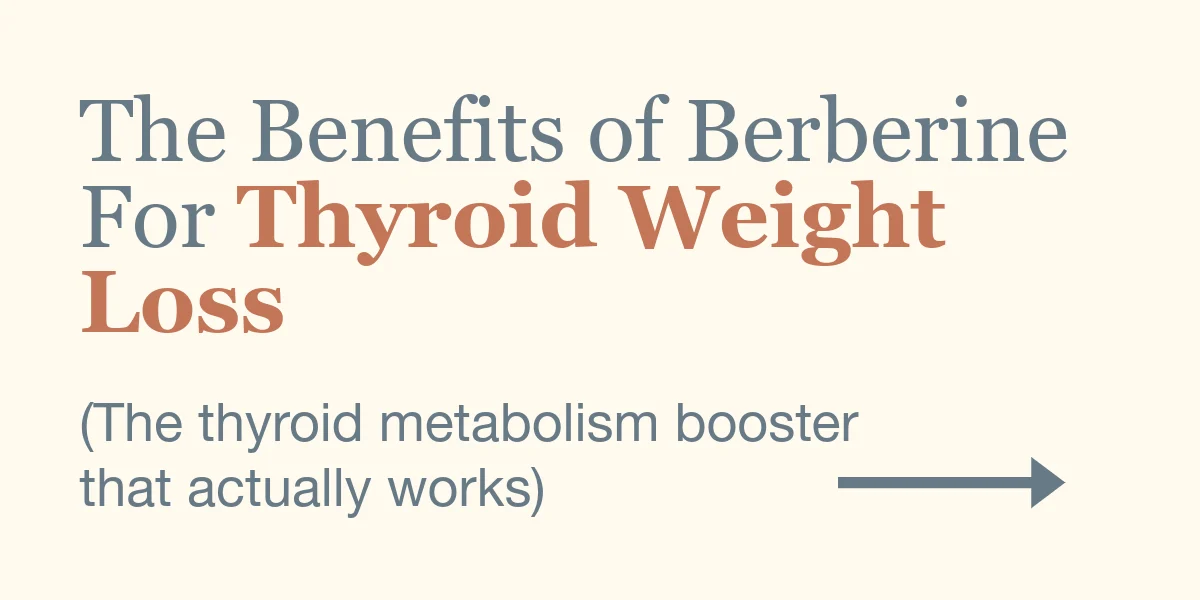
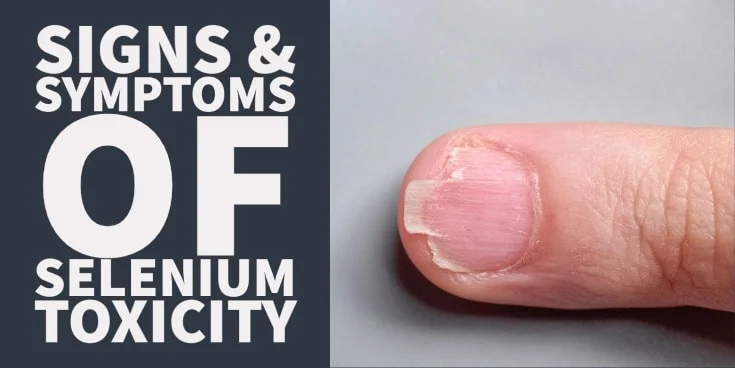
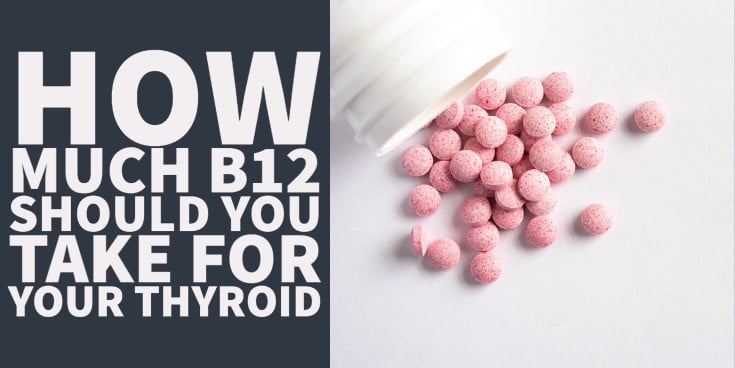

Loss of taste and/or smell, poor wound healing, cracks/lesions at the corners of the mouths unexplained weight loss and impotence are a few other symptoms of zinc deficiency. Zinc plays so many roles in the body. I know you can’t mention everything in one article but you should mention the importance of Zinc and copper balance. Supplementing iron can interfere with zinc absorption and if one is deficient in zinc they may likely be low in vitamin A also and potentially B6. Phytates can also interfere with absorption of zinc.
Hi Jen,
Good points! I don’t mention those because it’s highly unlikely that any of those symptoms would be missed 🙂 I wanted to focus more on the suboptimal zinc deficiency symptoms that one might experience with low normal zinc levels, the type of symptoms that someone would not go to their doctor for. I’m more interested in trying to help people who are feeling “blah” get back to 100%.
Yes but as she mentions, synergistically is it better to just take a whole food multivitamin (like Rainbow Prenatal for reproductive age woman) that has 13 mg zinc ?
Hi Isabel,
I’m not sure I’m following the question. Are you asking if it’s better to take a multivitamin with copper, zinc, and iron together?
Why does iron interfere with zinc? I need to take iron! What’s the solution then?
Hi Yolz,
Please see my most recent comment to you about this topic.
What is the best kind of zinc to take?
Hi Amy,
Zinc glycinate works well.
Hi Dr Child’s,
I have Graves’ disease s/p RAI 7 plus years ago. My doctor does zinc blood levels and found mine to be out of range (below the bottom of “normal” range while faithfully taking 50 mg of reacted zinc nightly. I’ve since bumped up to 100 mg but haven’t had recent labs drawn since increasing dose approx 2 weeks ago. I see in your post you mentioned 10mg day as safe dose. Should I be concerned I’m taking a much higher dose?
Hi Kim,
Just keep in mind that the body can only absorb around 7-10mg at one time so taking a dose higher than this isn’t helpful unless it’s multi-dosed throughout the day. There’s no evidence to suggest that 50-100mg doses are even helpful.
Hello from New Zealand. I’m hypothyroid/Hashimotos (since early 1990s)and go through periods of increased hair loss and find taking zinc really makes a big difference. I also start having periods of sudden fatigue with activity along with feelings of low blood sugar which I find zinc supplements along with a multi B makes a difference in both these problems. It was interesting that you said zinc and B6 deficiencies are linked and I also know B12 deficiency can be a problem with hypothyroidism. I also have many food sensitivities and environmental allergies which is no doubt linked to all this. I’m also gluten/dairy free which makes a big difference in general. Thankyou for your information Dr Westin it’s very helpful.
Hi Sheron,
Glad you found the information helpful!
I have 5 out of 9 symptoms. I also have Hashimoto’s Dx, taking Liothyronine and Synthroid. I take the Thyroid Daily Vitamins that you sell and was wondering if the Zinc 5 mg is enough? I have read that you can take up to 50 mg. The biggest defense against COVID is Zinc, Vit D, and Vit C, and I think I proved it, as I had it last month. It was no more than a bad cold. I am unvaccinated. Can you stay on 50mg?
Hi Marie,
The body can only absorb around 7-10mg at one time so using more than that doesn’t help unless you multi-dose it throughout the day and even then it’s questionable. I find the smaller doses to be more effective which is why I include them in my supplements.
My son (Congenital hypothyroid) often gets cracks in corners of mouth–I thought this was due to his levels being too low or too high, but I see someone mentioned this could be zinc deficiency? Would you think of it as due to meds too high or too low or zinc? I have been supplementing him with 15-20 mg for several years now. Now I see that may be too high!
Hi Pamela,
It’s hard to say without more information. I would start with getting his lab tested to see where he’s at. From there you can supplement and monitor his symptoms as well as his blood levels.
Hi
I have all 5 symptoms plus many more. Deficient t3/t4 over 2 years. Took zinc extract for awhile. only taking 30 mg picolinate. supp. Intermittent. Will take consistent at same mg as I am very beat up.
Hi Cindy,
It may make more sense to focus on your T4/T3 levels over zinc if you’ve supplemented previously.
Hi
I am very focused on t4/t3 since May 2019 along with everything else related. I read medical. Have seen many various top physicians who supposedly treat thyroid…. what a joke! Only 1 who truly understands thyroid. Doing Tirosint. Cytomel not processing as it should. Need SR T3. Now to find doctor who writes it.
Restartmed is my Bible.
Thank you for that.
Hi Cindy,
Glad you think so! Thanks for sharing and it sounds like you are on the right track 🙂
Thank you for the article, Dr. Westin.
Have you ever seen zinc allergy in your patients? I am allergic to zinc supplements. My lymph/face/throat swell huge, struggle to breathe, pressure on chest; so, very bad allergy. It’s a big problem, as you listed above!
Just curious if you have seen it before. I have a good functional doc, but this is unheard of.
Thank you for your efforts!
Hi Dayna,
Because zinc is essential, I can’t really think of a way that you could truly be allergic to it. If you were, then that situation would be incompatible with life. Instead, you are probably reacting to the complex bound to zinc which is what can happen with iodine. I discussed how/why this occurs here: https://youtu.be/4JFN-Ra2Uos
Thank you, Dr. Westin!
Does elemental zinc (no additives) have something bound to it?
In other words, if it is just zinc, not zinc sulfate, not zinc glycinate, etc. does that mean nothing is bound to it?
I am deeply grateful for your insight and will review this w/ my functional doc! You are very kind!
Personally I would focus on what is preventing the zinc from being absorbed by your body.
Just taking vitamins and probiotics are not useful if your gut is severely damaged, as is often the case with autoimmunity
I would suggest reading Gut and Physiology/psychology Syndrome by Dr Natasha Campbell McBride. You may need to restore your microbiome and heal your gut wall in order to efficiently digest your food. Gut flora and the gut wall need to be optimized to absorb nutrients efficiently.
Hi Isabel,
While it’s certainly important to restore gut health, I don’t think gut dysfunction impairs absorption as much as most people think. The use of digestive enzymes can also help tremendously with this issue which allows you to work on more than just your gut.
How many milligrams should you take in a day Zinc glycinate?
Hi Danielle,
The body can only absorb around 7-10mg at any given time so if you want to use higher doses you should split your dose up throughout the day. I prefer lower ranges but some people use higher doses in the 25-50mg range. I just don’t find the higher doses better than lower doses.
What would you recommend as the average dose of Zinc glycinate to take per day?
Hi Judy,
The body can only absorb around 7-10mg at any given time so if you want to use higher doses you should split your dose up throughout the day. I prefer lower ranges but some people use higher doses in the 25-50mg range. I just don’t find the higher doses better than lower doses.
I started taking 90 mg zinc (for corona virus-prevention)as one of 3 major supplements found to be effective…this was the dosage suggested; but
After taking it for several days my finger &toe joints began aching…I stopped
Taking it…my discomfort subsided&ended…could it be the dosage? Or perhaps
I don’t need it? I am on 50mcg of L-Thyroxine,(am also on metformin 500 mg
3x day plus Prandin 2mg/4tabs daily+Benicar Hct 40/25…I was diagnosed as:
Metabolic Syndrome(which included high triglycerides (1026) when I began treatment several yrs ago…it is now @260).I am 81checked 2-3mon by Endocrinologist
Hi Nancy,
90mg of zinc is a fairly high dose of zinc so your symptoms may have been from the high dose.
Hi dr Childs
Thank you so much for those information. I lost senses of smell and taste 10-15 year ago and no dr mentioned ever Zn. I finally figured it out 45mg did not make any difference but 75 yes. After 1 month l got back 50% of my senses.
Another thing is that I have HASHIMOTOS hypoth. bu when l go to hot counry a become HYPER and l cat my intake of l-thiroxine from 50 to 25 mcg. Belgiums dr thinks that its nonsense and that climat, high temperature has nothing to do with Th. Gland. Even Parkinson d. Dr put “parkinsonism psychogene” and after Dat-scan and MRI he had to admit that is real and not imagined. Why dr refuse to diagnosed thyroid problem? Is there link between thyroid and Parkinson? Thank you so much l appreciate your help. Vesna Spoljaric Woodgate
Hi Vesna,
I’m unaware of a direct connection between the two but they can both present in similar ways and can co-exist which may make diagnosing one or the other more difficult.
Hi ,
I have Hashimoto’s, thinning hair, no appetite & no energy..
Hi Gerry,
Checking out your nutrient status, including iron, zinc, selenium, and iodine would be a good place to start!
Hi, have recently started taking zinc supplements thanks to your excellent advice.
Here’s a question, I’ve been reading a lot about how turmeric is good especially “golden” milk. Could you do an article on this please. Everything is very confusing about what hypothyroidal sufferers should and shouldn’t do.
Many thanks, Chris.
Hi Chris,
I suppose the exact recipe matters when we are talking about golden milk but turmeric is generally well tolerated among thyroid patients (though, not always!).
I have hypo and antibodies slowly increasing the last couple of years but still within normal range, but hair fall is constant. I’ve been taking Alive liquid multivitamin which has ranges > 100% for Iodine, Zinc etc, but I still have ridges on my nails, hair fall, and few white spots on nails. Cut out gluten & soy. Also taking Iron, Vit D, Flax Seed Oil, T4 & T3. All levels good. Should I consider additional Zinc supplementation? Wondering if my body is not absorbing the liquid multivitamin since it’s made from fruit/veggies and I do have food sensitivities. Endo cannot figure out hair fall – says maybe antibodies and wants to put me on methimazole to see if it helps..
Thank you for your service to humanity, especially for those with thyroid issues. I just received blood test results. My zinc was high @ 131 and my copper was low @ 69. I take a 30 mg zinc and a 1/2 of a 3 mg of copper. This supplements are in tablet form and can be easily cut in halves or fourths. From what I am reading from you, I would be better off to take these supplements more than once a day, but in what amounts?
I take several of your supplements and there are three that contain zinc. Should I not be taking these together since it is double the 10 mg/day range you mentioned in the article? I have Hashimoto’s.
T3 Conversion Booster: 5mg (am)
Thyroid Adrenal Reset Complex: 5mg (am)
Thyroid Daily Essentials: 12.5mg (pm)
Hi Lori,
No, those can all be taken without any issue. You can safely take up to 25mg/day without any issue since most of that won’t be absorbed. If it isn’t causing stomach issues then you are good to go. The most you would need to do is split them apart and take the T3 and Thyroid adrenal in the morning and the thyroid daily essentials 5 hours later.
Thanks for this excellent article. I have Thyroid issues, food allergies and sensitivities, and sensory defensive issues which is why I was looking for answers. I found another article where someone found that Zinc deficiency was linked to SPD. Then when I read your article I found an answer to a whole bunch of problems I have been having. I took zinc and in one night had results! I am flabbergasted! My edginess is reduced, the crawling sensation in my legs has stopped and even my tinnitus has been cut in half. I have more energy to move than I have had in years. If this made me loose weight as well I would be absolutely stunned. This is a game changer for me.
Hi Karen,
Glad to hear it! Thanks for sharing.
Hi Dr. Childs
I can sure see why people are so greatful for your thyroid info.
I get TSH checked and sometimes is ok at 2.16 and last time it was 3.5. but because the med range is between .32 to 5.04 on form (in Canada) and both tests are in range they will not check my T4 -to T3 conversion. Even when Doc asks to add them, they still cancel them. Meanwhile I am moving around like a slug and weight hopeless. I usually take zinc but havent lately but will try again. Doing mostly Keto diet just to stay the same because I gain all the time, like daily if adding reg foods. Still docs say, just eat healthy and exercise. Yeah, right! I told him, if that were the case, no one would be fat! Like its a new concept.
Anyway is it possible to not have proper conversion of t4 to t3 even if the tsh were ok? Had lab blood tests for all regular things, which all were ok. I have ok A1C but fasting bld sugar is borderline. My CRP is great, way low at .06 (range goes to 5) which would show good diet I guess. So what next?
I realize you dont know me, so cant diagnose but sometimes some bit of info just really helps, which was not previusly looked at.
Thank you so much
LJR
Hi Lorraine,
Yes, it’s definitely possible to have a normal TSH but have issues with thyroid conversion. Your next step will be to get a complete thyroid lab panel, though, because you can’t really know for sure what’s going on without more information.
What brand do you recommend? It’s frustrating to spend hours researching brands and dosage. TIA!!
Hi Maria,
I’m biased so I will always recommend my own 🙂 https://www.restartmed.com/product/thyroid-daily-essentials-thyroid-multivitamin/
Doctor Childs, many minerals have their counterparts that must be balanced. Yin and yang. Like sodium and potassium, calcium and magnesium, zinc and copper. Would it make sense that an overload of copper could present as a zinc deficiency? I’m curious because most households in the US and probably EU have copper plumbing. Without a water filter could we be unwittingly overloading our bodies with copper?
Hi Katherine,
In general, hypothyroid patients tend to have low levels of both copper and zinc. I think it’s more likely that low levels contribute to thyroid dysfunction as opposed to excess levels, at least for most people.
I just a comment above, saying that iron interferes with zinc absorption ..but I need both. If this is true? How do I take my supplements then?
Hi Yolz,
If you were concerned about iron interfering with zinc absorption then you’d just take them apart from one another by 4 hours.
I’m not sure you’d need to though based on this information:
“Further, consumption of iron fortified foods had no impact on zinc absorption among adult human subjects or infants [68,69]. In addition, a study among pregnant women consuming therapeutic iron doses did not find changes in either serum zinc or exchangeable zinc pools measured using stable isotopes [70]. It is evident from all these observations that negative effect of iron on zinc absorption is only observed when therapeutic doses (2–3-fold excess, or higher, iron relative to zinc) are given to human subjects.”
https://www.ncbi.nlm.nih.gov/pmc/articles/PMC6722515/
Im fatigue, always had problem coughing with mucus, found out my Tsh is high but negative for thyroid antibodies should i start taking zinc supplement? I am using right now zicam swab and wow no more coughing? Now i want to use it everyday but it says no more than 3 days what do you recommend?